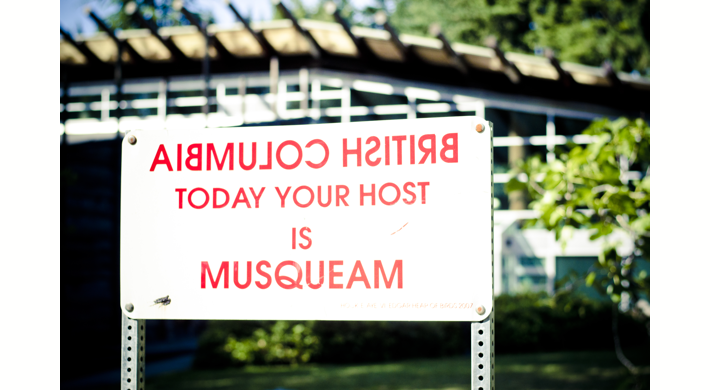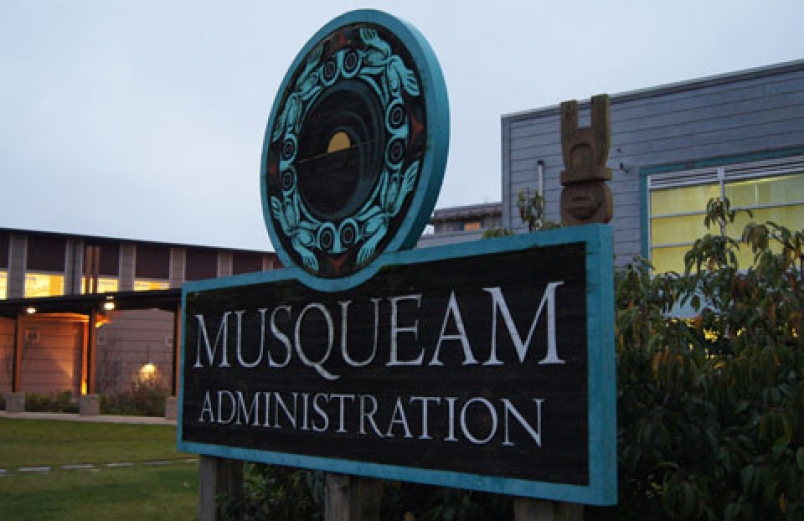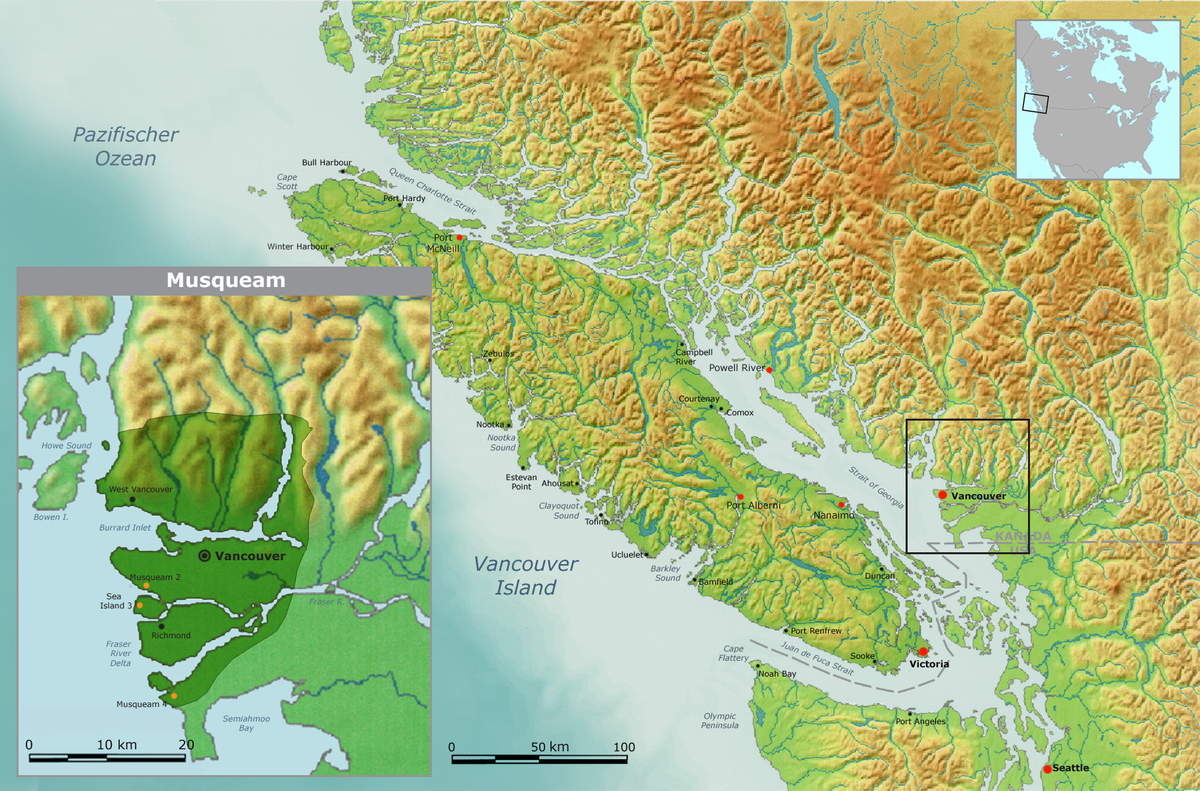
In a press release from the Musqueam Nation, Chief Wayne Sparrow stated “Musqueam has not been meaningfully consulted nor accommodated for the GMT (George Massey Tunnel) project. This project is in the core of our exclusive territory and the Provincial and Federal government have not received Musqueam’s consent.” Other media have picked up this unfulfilled duty to consult where indigenous rights and title exists.
This lack of consultation is a gaping omission given the Province’s claim through the Minister of Transportation that they have undergone a robust consultation process, even though this seems very slim on their website. And the Musqueam Nation have a very valid reason to be listened to and accommodated in any process impacting the Fraser River at this location-they have inhabited this land for thousands of years.
The proposed Massey Bridge lies squarely in the “heart of Musqueam territory and the BC (British Columbia) government has not received consent from Musqueam to proceed. It is in an area that has been occupied by Musqueam since time immemorial. GMT is surrounded by heritage sites, and other culturally important sites, including fishing areas in the Lower Fraser River that Musqueam has Aboriginal rights to fish, which are protected by the Canadian Constitution after a Supreme Court of Canada ruling (R. v Sparrow, 1992).

The Musqueam note that the tunnel removal “will add to the negative cumulative effects in Musqueam’s territorial waters in the Fraser River. BC and Canada have not considered these effects as they continue to approve projects like this”. And the First Nations is quite clear about what they think of this project: “Musqueam will not stand for the continued degradation of our lands and waters. The BC and Canadian government have much work to do with us to ensure the GMT project can proceed according to Musqueam conditions”, said Chief Sparrow. He added, “Musqueam is leading in areas of stewardship and management in our territory, and will raise the bar on all future projects in Musqueam territory. We are not against development, but it must be done in ways that include Musqueam values, and ensures the protection of our rights.”
The Musqueam values are being echoed by others who have done their due diligence and realize the ecological degradation of the lands and the river that will occur, including the damage to the river in the removal of the tunnel and further dredging to accommodate larger ships.The Province will say they are not doing this work which is partially right, because in this shell game the dredging would be under the auspices of the Port which is a federal authority.
When the stewards of the land, the Nation that has solidly lived here for thousands of years before Canadian Confederation speak, we all should be listening. The fact that this First Nation was not actively consulted is surprising. As the Musqueam First Nation says on their website, colonization resulted in “our traditional and customary system of authority quickly became secondary without the awareness of native leadership“.
It looks like the Province is still going bull-headedly on that same path, regardless of the devastating impacts on the Agricultural Land Reserve, the sensitive eco-system of the Fraser River delta and its shoreline, the wishes of the Metro Vancouver Mayors’ Council and the interests of the First Nations who have rights to this Territory.


Posted in
- climate change (705)
- First Nations rights to consultation (1)
- Gateway Program (161)
- inequality (180)
- Massey Bridge (152)
- Mayor's Council (426)
- metro vancouver (374)
- observations (205)
- Peak Car (178)
- Peak oil (91)
- Port Metro Vancouver (65)
- profile (925)
- real estate (260)
- social issues (353)
- sustainability (595)
- TransLink (793)













Author
Reblogged this on Sandy James Planner.
Like the premier’s vaunted pipeline approval process, this and all major expansions to the road network should meet five conditions:
1. Is it possible to build this project with few physical impacts on agricultural land, waterways and the environment? Is it even possible to build given the very serious geotechnical concerns? [These are very doubtful, and the proponent has not presented independent assessments and evidence to state otherwise. Therefore the answer has to be “no.”]
2. Has this project received adequate public consultation and undergone independent assessments for risk, demand and regional planning justification? [Given the response from 20 of 21 Metro mayors, a host of comments and analysis by transport and regional planners, and now the Musqueam Nation which outlines a Constitutional necessity for consultation, and given that no transportation alternatives were presented to the fait accompli bridge and freeway proposal, the answer has to be a resounding “no.”]
3. Is this project economically justified?[There may be some up front benefits with temporary construction jobs, but operational costs will never be recovered at anytime during the project’s lifespan. The capital costs will in part be recovered through tolls, assuming the toll-friendly government is re-elected. The private tolling firm will take a cut to cover its expenses and profits, essentially given a subsidy. In counterpoint, the higher taxes for maintenance and the tolls will bring road travel slightly closer to the actual per capita cost to society, but full cost recovery of auto dependence will prove impossibly unaffordable to commuters except for the wealthy. Moreover, the project budget will inevitably balloon to exceed $4 billion. The proponent claims to be a good fiscal manager compared to the opposition, yet they have increase the provincial debt directly and with contractual commitments by almost $140 billion in 16 years, over 1,000% more than the opposition’s record. Other road proposals have been sounded and will tally to another $7 billion. Given the history of grandiose megaprojects and past fiscal performance, the answer leans heavily toward “no.”]
4. Does this project meet the planning objectives of the region within which it will sit? [First, the traffic data doesn’t match the stated justification that traffic demand is rising. It is not. But it certainly will once induced demand comes into effect with a huge increase in road space. Commercial truck traffic serving the Port does not work to a 24 / 7 schedule common in every other port on the planet, and there is evidence they are stacking the rush hours through the existing tunnel to fudge the congestion numbers in favour of the proponent. The region has a balanced transportation plan with transit pulling ever upwards as time progresses due to its urban and environmental efficacy and measureable returns. This project is being imposed on the region with little input, and its impacts on regional transportation and urbanism will be profoundly negative. The proponent is keen to meet the private goals of the special political donor interests that support the bridge over the regional public good. The answer is a strong “no.”]
5. Does this project create a lasting legacy for the region and the province [The answer is certainly “yes.” But that legacy will prove very damaging from the perspectives outlined above as time moves onward.]
deleted as per editorial policy.
Gross hypocrisy to hear someone who made their fortune on property rights decrying other people asserting theirs. Stomach-churning really.
deleted as per editorial policy.
deleted as per editorial policy
editor’s note.
Thomas: You will be banned from the website if there is another deviance from editorial policy. Final warning.
deleted as per editorial policy
Seems like a good place to mention a CBC article from April 23 & 24 about a group of “investors” in Toronto who lost $9M in a syndicated mortgage scheme. In this case, one of the deal makers was a convicted fraudster working with an r.e agent who was, of course, completely innocent. The sweet innocent agent, through affinity connections as a long-term church-goer, signed up a pile of parishioners.
Even when a syndicated mortgage deal maker is not a deliberate fraudster, there’s a lot of money that gets stuck to their fingers during the transaction – and after – in management fees. If their deal-making was in fact so good, they could go to a bank and lay out their proposal. But you can’t bs a bank. Incessant posting to create a persona, to arrogate gravitas, doesn’t cut it with the big five. They look at the numbers.
deleted as per editorial policy